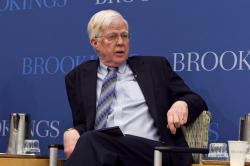This paper examines the economic situation faced by U.S. economic policymakers in the second Bush Administration. The first section focuses on the outlook for the economy over the next several years. It highlights the important role of investment demand in forecasts of continued expansion of the domestic economy, and the fundamental strength of the supply side of the United States economy. Productivity growth continues to be very rapid, with most of the recent improvement being due to improvements in the service-producing industries. Inflation remains low despite increases in energy prices, and the United States has a relatively favorable outlook compared to other industrial countries. The major short-term risks are associated with potential disruptions of the world energy markets.
Despite the outlook for continued growth, the United States is confronted with two severe imbalances: large and sustained fiscal deficits and a growing external imbalance. This paper traces the sources of the dramatic change in the fiscal situation that has occurred in recent years, and points to a future of large chronic budget deficits. However, I argue that from a strictly domestic perspective, the budget deficits are sustainable, and the Congress and the President are unlikely to undertake any significant corrective actions.
On the other hand, the continued growth of the external current account deficit raises much more serious concerns since it is doubtful that the current path of growing deficits can be sustained. The paper reviews the domestic and external factors that have contributed to the steady growth in the deficit in recent years, and examines the domestic and international economic implications of the options for scaling the deficit back to more manageable dimensions. The U.S. external deficit is a severe challenge for future U.S. policymakers, but also for a global economy that has become very dependent on continuation of the U.S. trade deficit. It is in this context of a potential external crisis that the future U.S. government may be forced to take action to reduce the fiscal deficit and contract the nation’s excessive rate of consumption.
The Brookings Institution is committed to quality, independence, and impact.
We are supported by a diverse array of funders. In line with our values and policies, each Brookings publication represents the sole views of its author(s).



